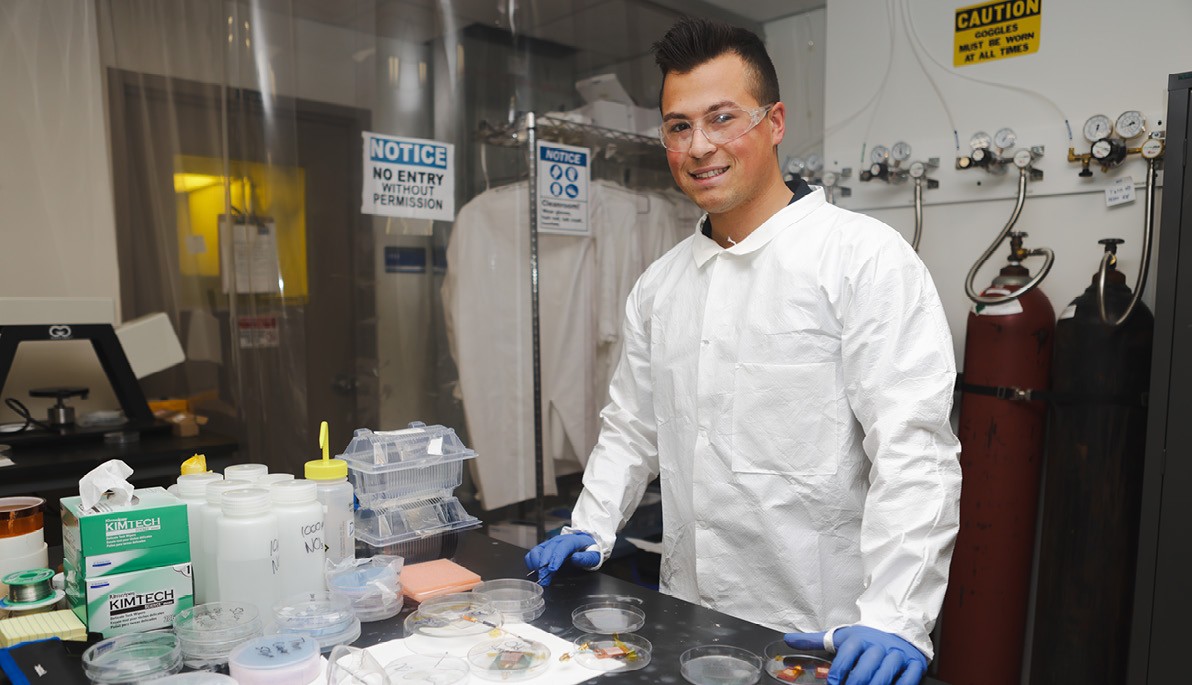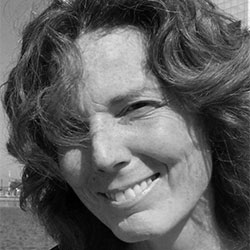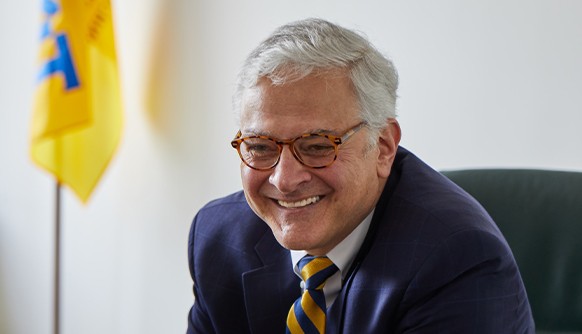News
College of Engineering and Computing Sciences Ph.D. Programs Are Making Great Strides
April 22, 2024
Pictured: Michael Kohler is working on integrating SAW sensor technology into wearable devices aimed at capturing and analyzing biomechanical data from the human body.
What if wearable devices could capture and analyze biomechanical data from the human body? What if game theory could be used to foresee how proposed changes in traffic rules could affect people’s attitudes toward commuting? These are just two examples of the open-ended questions being researched through nascent Ph.D. programs within the College of Engineering and Computing Sciences.
Launched between 2020 and 2022, the Ph.D. programs augment New York Tech’s offerings in engineering and computer science, provide faculty with greater opportunities to conduct research, and place doctoral candidates on the cutting edge of science and technology as they prepare for roles in industry or academia.
Impetus for Creating Programs
Ph.D. programs help expand knowledge creation. The impetus for creating the programs began with the evolution of faculty members. “We experienced a new generation of faculty about 15 years ago. They were very active in research,” explains Babak D. Beheshti, Ph.D., dean of the College of Engineering and Computing Sciences. “They are working in labs and asking open-ended questions.”
They are also professors, which limits the amount of time they can spend in the lab. Student researchers certainly help, but they are limited to the time they have available in their bachelor’s or master’s programs. “Master’s students would only be available for one and a half years and would then move on to the job market,” Beheshti notes.
In addition to this push for greater research opportunities, New York Tech recognized the importance of greater representation of the university in the field of research. “Strong research exists in the world’s best universities,” Beheshti says. “We arrived at this stage where we had to present that strength of the university to the world.”
The efforts to support and increase cutting-edge research that has grown organically over the last 15 years gained momentum under the leadership of President Hank Foley, Ph.D., who announced in 2022 a goal for the university to achieve Research 2 (R2) university status—a doctoral university with high research activity—by 2028. To achieve this designation, a university must conduct a high level of research, spend at least $5 million on research and development, and produce at least 20 research doctorates. “We prioritized Ph.D. programs in computer science and engineering as the most promising to launch,” Beheshti says.
Thanks to a significant financial investment from New York Tech, the Ph.D. programs launched with four tracks: computer science, bioengineering, electrical and computer engineering, and mechanical engineering. The program’s advisory board consists of professors and research experts from: Arizona State University; University of Maine, Orono; Stony Brook University; Texas State University; and Tufts University.
A Growing Program with High Expectations
The 20 Ph.D. students currently enrolled “have a passion for research,” says Helen Gu, Ph.D., associate dean and director of the computer science Ph.D. program. Thanks to student interest and faculty support, the computer science and engineering programs are growing at a steady pace. About 20 New York Tech faculty members are involved, according to Xun Yu, Ph.D., professor and chair of mechanical engineering, engineering management, and construction engineering, and director of the engineering Ph.D. program .
Based on these promising numbers, Beheshti says the goal is to recruit 25 more students for the next academic year. “After two years, we want 80 fully financially supported Ph.D. students,” he adds. While it would be a natural process for current New York Tech students to rise toward Ph.D. programs, the university relies on its international reputation to draw candidates from around the United States and the world.
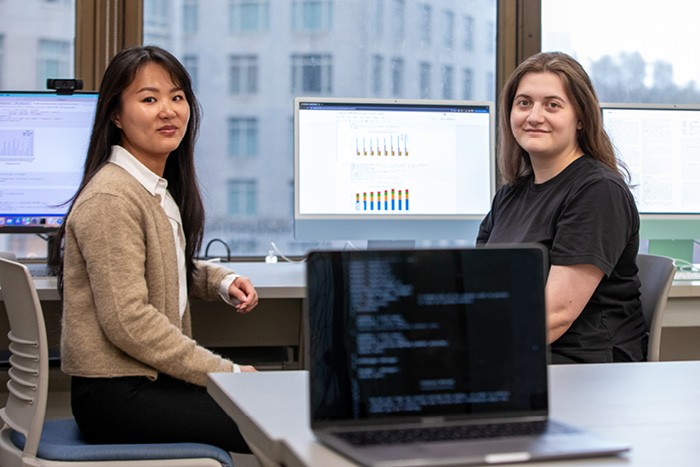
Maria-Victoria Vladucu (right) is looking at ways to adopt blockchain principles typically used in the financial sector for the food supply chain, which would simplify the process of tracking food, ensuring safety and quality. Helen Wu’s research uses game theory to model travelers’ behavior when congestion pricing is implemented in New York City this summer.
The New York Tech Difference
As the Ph.D. programs continue to grow, the university seeks to maintain the personalized approach for which New York Tech is known. Ph.D. candidates have one-on-one access to experts in their subject matter. They do research with their mentors. In some cases their research is New York-focused, meaning they have direct access to the areas where their research might have the highest impact.
New York Tech is also part of a doctorate consortium with other area research universities. This means that if a particular course is not available at New York Tech, doctoral candidates can take it at CUNY, Columbia, Cornell, Princeton, Rutgers, Stevens Institute of Technology, or Stony Brook and receive full credit. Students at these schools can also take advantage of courses available at New York Tech.
Doctoral candidates receive full scholarship towards their tuition and an annual cost of living compensation of $25,000, with a percentage increase as they progress. Beheshti points out that the compensation ensures they can focus on their studies and research and not have to worry about income.
The program also accepts doctoral candidates who are employed in the computer science or engineering industries. Currently, two Ph.D. candidates are fully funded by their companies. “We make it as flexible as possible for those students. They have the same interactions with faculty and the experts in their subject matter,” Beheshti says.
Pursuing an Advanced Degree Brings Added Opportunities
Soon after beginning his master’s program at New York Tech, Michael Kohler, a candidate in the Class of 2026, connected with Associate Professor Fang Li, Ph.D., who asked him to do research. “I’m aggressive in looking for opportunities,” Kohler said.
When the Ph.D. program was announced, it was a natural choice for Kohler to continue researching. He is now on the bioengineering track.
Kohler is working with Surface Acoustic Wave (SAW) sensors. “The core of my work involves the intricate design and fabrication of these SAW sensors in highly controlled clean room environments,” he explains. “I am actively working on integrating SAW sensor technology into wearable devices aimed at capturing and analyzing biomechanical data from the human body.”
The outcomes of this research could have a profound effect on rehabilitation, human augmentation, and the study of human motion in sports sciences. “In physical therapy, for instance, wearable devices equipped with SAW sensors could provide real-time, precise measurements of joint movement and muscle activity, enabling therapists to tailor rehabilitation programs to the specific needs of their patients,” Kohler explains.
Kohler appreciates the challenges of his research and the support he has from Li. “Dr. Li and I exchange knowledge and mutual respect,” Kohler says. “I wouldn’t trade this for a bigger program. It’s a learning experience. These successes will help me with the next step in my career.” That might involve academia, he notes. “I could see myself teaching the next engineers.”
Nicholas Cariello (B.S. ’18, M.S. ’19), a candidate in the Class of 2026, who is on the computer science track for his Ph.D., agrees that advisor and faculty relationships are a crucial component of his doctoral pursuit. “My advisors are always there to answer questions, offer guidance, and have been instrumental in reigniting the academic half of my brain after spending a good amount of time in industry,” he says. “The people really make the difference, especially in a program like this, where so much of the work comes from social engagement.”
Cariello’s research focuses on biometrics for use in continuous authentication. “In today’s technology-centered world, knowing that your devices are secure is incredibly important,” he notes. “The question for enabling continuous authentication becomes doing this without impacting the user. For instance, asking a user to scan their thumbprint or enter a passcode every 30 seconds is not practical. Instead, we propose behavioral biometrics, things that you do, knowingly or unknowingly, that can be used to identify you as a genuine user.”
The challenge, Cariello notes, is determining what is meaningful enough to capture. “I am currently working on a paper that centers around the use of motion capture data as a biometric to determine the efficacy of body posture and movement.” Cariello is doing research on his own and with his advisors, Associate Professor Kiran Balagani, Ph.D., and Associate Professor Paolo Gasti, Ph.D.
Cariello received his bachelor’s and master’s degrees from New York Tech. He currently works as a technical lead with IBM while he pursues his Ph.D.
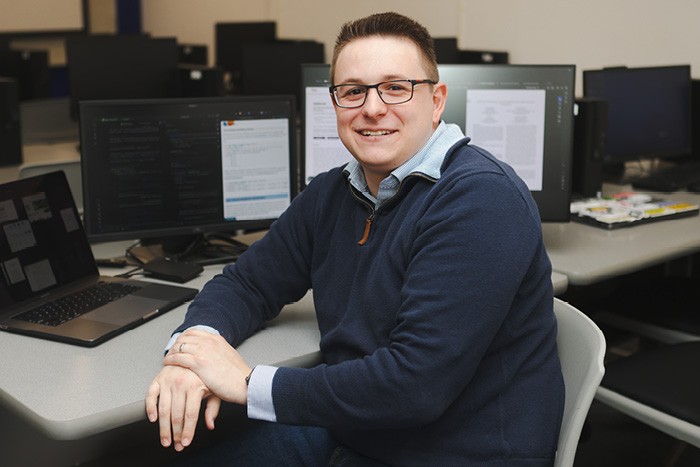
Nicholas Cariello’s work proposes behavioral biometrics that can be used to identify a person as a genuine user.
Maria-Victoria Vladucu, a candidate in the Class of 2027, also on the computer science track, says that working with her advisor, Cecilia Dong, Ph.D., has made an incredible impact on her research.
Vladucu’s study is focused on adopting blockchain principles typically used in the financial sector for the food supply chain. “We’re looking at how to minimize waste and find ways to make the process available and fair,” she says.
Dong recommended that Vladucu acquire certification in blockchain, bitcoin, and cryptocurrencies to better understand the concepts, which could lead to a clearer path toward applying them to the food supply chain. Using blockchain would simplify the process of tracking food, ensuring safety and quality. In addition, Vladucu notes it would be impossible to hack into the system. After completing her Ph.D., Vladucu hopes to share her knowledge in academia.
For Helen Wu, a candidate in the Class of 2025, who is focusing on electrical and computer engineering, the chance to apply her research to effect change in the New York area is a huge benefit. Her research uses game theory to model travelers’ behavior when congestion pricing is implemented in New York City this summer. Vehicles entering Manhattan’s Central Business District (anywhere below 60th Street) will incur a toll. The hope is to reduce traffic and travel time and emissions.
By employing game theory, which is a theoretical framework for strategizing social situations, this research can gauge the possible effects on travel behaviors. “We also want to see what factors will affect implementation of congestion pricing the most,” Wu adds. “The challenging part of the research is to model human behavior.” The exciting part for Wu is that the “research results could help the community guide their decision-making process.” This work is especially exciting for Wu, who hopes to stay in the New York City area after receiving her Ph.D. “We want to make an impact,” she says.
Impacts Can Already Be Seen
In the short time the Ph.D. programs have been offered, benefits for the university, faculty, and candidates can already be seen. The programs promise to enhance New York Tech’s impressive reputation within the areas of computer science and engineering. For faculty, conducting long-term research while mentoring the next generation of researchers brings incredible satisfaction. “Faculty receive research grants and support the students in their research to create a growing cycle,” Yu says.
After receiving their doctoral degrees, candidates have a wealth of opportunities available to them. Some will remain in academia; others will enter or reenter the workforce in high-tech industries such as cybersecurity. Whatever path they choose, they will be carrying with them the intimate academic and research experiences afforded by New York Tech’s Ph.D. programs.
“For me, the faculty and staff make New York Tech the special place that it is,” Cariello concludes. “I feel that my success is genuinely invested in. The staff is compassionate, supportive, and will do whatever they can to help you along.”
